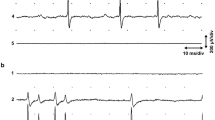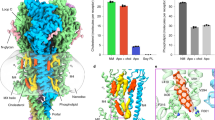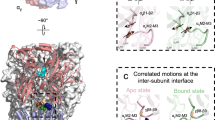Abstract
THE application of acetylcholine (ACh) to chemosensitive regions of vertebrate skeletal muscle fibres elicits a conductance change in the muscle membrane which results in a net inward current flow. During a steady response to applied ACh, the ACh-evoked current fluctuates about its mean level1–2. This fluctuation arises from the statistical variation in the number of open membrane channels and can be analysed to give estimates of both the conductance and the lifetime of single open channels. Analysis of drug-induced membrane current fluctuations has provided important information about the properties of cholinergic membrane channels in frog1–3, chick4,5 and rodent6–8 muscle cells. We report here some properties of ACh-activated channels in human myotubes grown in tissue culture. We have also made a preliminary study of the effects of a serum from a patient with myasthenia gravis on the properties of these channels.
This is a preview of subscription content, access via your institution
Access options
Subscribe to this journal
Receive 51 print issues and online access
$199.00 per year
only $3.90 per issue
Buy this article
- Purchase on Springer Link
- Instant access to full article PDF
Prices may be subject to local taxes which are calculated during checkout
Similar content being viewed by others
References
Anderson, C. R. & Stevens, C. F. J. Physiol., Lond. 235, 655–691 (1973).
Katz, B. & Miledi, R. J. Physiol., Lond. 224, 665–699 (1972).
Colquhoun, D., Dionne, V. E., Stenbach, J. H. & Stevens, C. F. Nature 253, 204–206 (1975).
Sachs, F. & Lecar, H. Biophys. J. 17, 129–143 (1977).
Lass, Y. & Fischbach, G. D. Nature 263, 150–151 (1976).
Dreyer, F., Muller, K. D., Peper, K. & Sterz, R. Pflugers Arch. ges Physiol. 367, 115–122 (1976).
Sakmann, B. Pflugers Arch ges. Physiol. 359, R89 (1975).
Colquhoun, D., Large, W. A. & Rang, H. P. J. Physiol., Lond. 266, 361–395 (1977).
Vogt, M. & Dulbecco, R. Proc. natn. Acad. Sci. U.S.A. 49, 171–180 (1963).
Heinemann, S., Bevan, S., Kullberg, R., Lindstrom, J. & Rice, J. Proc. natn. Acad. Sci. U.S.A. 74, 3090–3094 (1977).
Brown, K. T. & Flaming, D. G. Science 185, 693–695 (1974).
Cull-Candy, S. G., Miledi, R. & Trautmann, A. Nature 271, 74–75 (1978).
Neher, E. & Sakmann, B. J. Physiol., Lond. 258, 705–729 (1976).
Dreyer, F., Walther, G. & Peper, K. Pflugers Arch. ges. Physiol. 366, 1–9 (1976).
Bevan, S., Kullberg, R. W. & Heinemann, S. F. Nature 267, 263–265 (1977).
Author information
Authors and Affiliations
Rights and permissions
About this article
Cite this article
BEVAN, S., KULLBERG, R. & RICE, J. Acetylcholine-induced conductance fluctuations in cultured human myotubes. Nature 273, 469–471 (1978). https://doi.org/10.1038/273469a0
Received:
Accepted:
Published:
Issue Date:
DOI: https://doi.org/10.1038/273469a0
This article is cited by
-
Effect of sera from seronegative myasthenia gravis patients on neuromuscular junctions
Neurological Sciences (2013)
-
Monoclonal antibodies modify acetylcholine-induced ionic channel properties in cultured chick myoballs
The Journal of Membrane Biology (1983)
-
Postsynaptic currents in different types of frog muscle fibre
Pfl�gers Archiv European Journal of Physiology (1982)
-
Neuromuscular transmission in experimental autoimmune myasthenia gravis (EAMG)
Pfl�gers Archiv European Journal of Physiology (1981)
-
Acetylcholine receptors in organ-cultured human muscle fibres
Nature (1979)
Comments
By submitting a comment you agree to abide by our Terms and Community Guidelines. If you find something abusive or that does not comply with our terms or guidelines please flag it as inappropriate.



